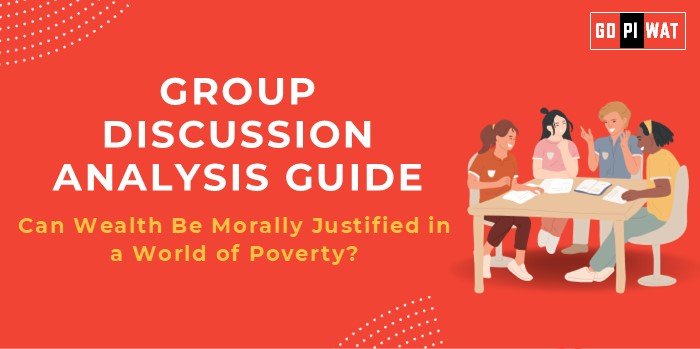📋 Group Discussion Analysis Guide: Can Wealth Be Morally Justified in a World of Poverty?
🌐 Introduction to the Topic
Opening Context: “In a world where nearly 10% of the population lives on less than $2.15 a day, the moral justification of wealth becomes a critical debate, especially for future leaders in business and policy.”
Background: Philosophers like John Rawls and Peter Singer have argued about distributive justice and moral responsibility. Meanwhile, the rise of global billionaires amid widespread poverty raises ethical questions about inequality.
📊 Quick Facts and Key Statistics
- 🌍 Global Poverty Rate: 8.5% of the world lives below the extreme poverty line (World Bank, 2023).
- 💰 Wealth Concentration: The richest 1% holds 46% of global wealth (Oxfam, 2023).
- 🎗️ Philanthropy Stats: Billionaires donated $27 billion in 2023, representing only 0.5% of their net worth on average.
- 💼 Income Disparity: CEOs in the US earn 351 times more than the average worker (Economic Policy Institute, 2023).
🤝 Stakeholders and Their Roles
- 🏛️ Governments: Design taxation policies and social welfare programs to address inequality.
- 💸 Wealthy Individuals: Influence wealth redistribution through philanthropy and ethical investments.
- 🌐 NGOs and Social Enterprises: Act as intermediaries to reduce poverty.
- 👥 Citizens: Play a role in advocating for equitable policies and ethical consumerism.
🏆 Achievements and Challenges
✨ Achievements
- 🎗️ Philanthropy Growth: Bill & Melinda Gates Foundation’s $8 billion yearly expenditure improves global health.
- 🎓 Social Mobility: Education initiatives funded by billionaires have lifted millions from poverty.
- 📈 Economic Development: Wealth creation has driven innovation and job opportunities.
⚠️ Challenges
- 🏚️ Structural Inequalities: Inadequate redistribution mechanisms exacerbate poverty.
- ⚖️ Moral Dilemmas: The luxury lifestyle of the ultra-rich starkly contrasts with global poverty.
- 🌍 Global Comparisons: Countries like Norway excel in reducing inequality, while others lag.
📄 Structured Arguments for Discussion
- ✅ Supporting Stance: “Wealth enables significant societal contributions through innovation and philanthropy.”
- ❌ Opposing Stance: “Accumulated wealth is inherently immoral in the presence of widespread poverty.”
- ⚖️ Balanced Perspective: “While wealth can drive progress, its concentration requires ethical scrutiny and proactive redistribution.”
🎯 Effective Discussion Approaches
- Opening Approaches:
- 📊 Statistical Start: “With 46% of global wealth concentrated among the top 1%, is it ethical to defend such disparity?”
- 📜 Historical Lens: “From Carnegie’s libraries to Gates’s vaccines, wealth has reshaped society, but at what moral cost?”
- Counter-Argument Handling:
- 📚 Use principles like utilitarianism or Rawls’s theory of justice to argue for equity.
📊 Strategic Analysis of Strengths and Weaknesses
- 💪 Strengths: Wealth drives innovation, philanthropy, and economic development.
- 📉 Weaknesses: Rising inequality, societal resentment, and ethical challenges.
- 🚀 Opportunities: Ethical wealth redistribution via policies and corporate social responsibility.
- ⚡ Threats: Public backlash, policy interventions, and ethical scrutiny.
📈 Connecting with B-School Applications
- 🌐 Real-World Applications: Case studies on ESG investing or corporate philanthropy.
- 🗣️ Sample Interview Questions:
- 💬 “How would you balance wealth creation and ethical responsibility in business?”
- ⚖️ “Should businesses have a moral obligation to address poverty?”
- 🎓 Insights for Students:
- Develop frameworks for balancing profit motives with societal impact.


